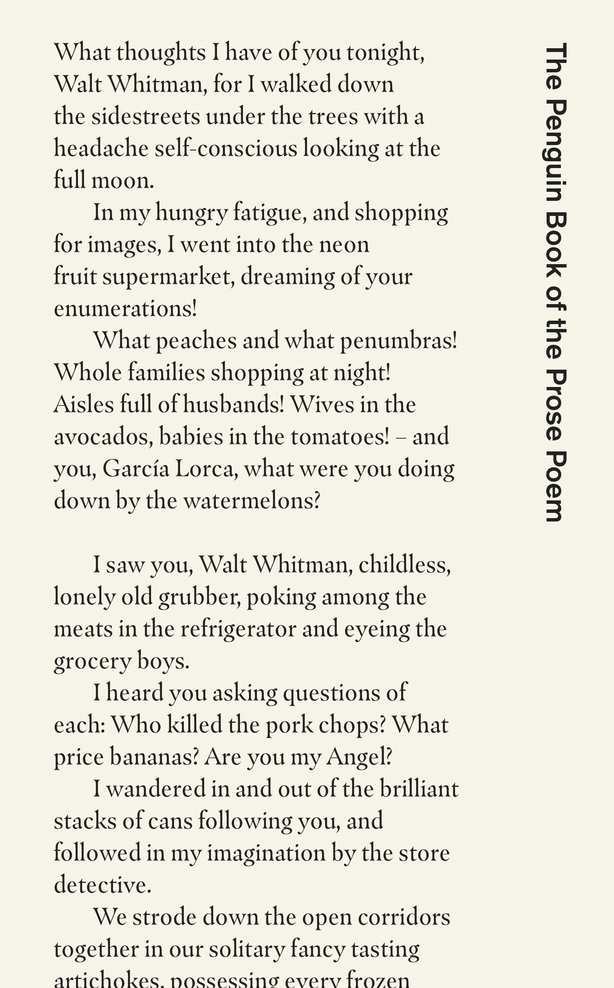Seamus Heaney, Charles Baudelaire, Pablo Neruda, Margaret Atwood, Allen Ginsberg, TS Eliot and Elizabeth Bishop are among the poets featured in this selection of prose poems - English and poems in translation - from the past 175 years.
Well-known practicioners and the work of forgotten poets jostle within the covers of this comprehensive collection which runs to over 400 pages, edited with an absorbing introduction by Jeremy Noel-Tod.
Prose poetry is a tricky genre, it’s a bit like those meticulous paintings that copy photography, too close for comfort, yet needing that closeness to exert a numinous effect on the reader. That reader, it can be safely assumed, approaches a prose poem expecting something that inclines more to a poem than to a piece of prose.
Noel-Tod sets out his stall in an illuminating introduction, signalling how these poems "comprise an alternative history of modern poetry and an experimental tradition that is shaping its future."
A Supermarket in California is Allen Ginsberg’s paean to Walt Whitman, with a fond glance too at the great Spanish poet, Federico García Lorca, skulking there in one of the antiseptic aisles. And you, García Lorca, what were you doing down by the watermelons?
The poem was written in the mid-1950s when supermarkets were new affairs at the edge of the American cityscape, so no doubt the conjugation of supermarket and Whitman was once an eye-opening, slightly gimmicky one. Because such novelty no longer exists, the poem has perhaps lost some of its spark. Hearing Ginsberg read it in his dark, sonorous tones might have been the best way of appreciating it, but the feline Beat growler - well, he purred really - is no longer around to oblige.

Margaret Atwood (author of The Handmaid's Tale) makes an entry with In Love with Raymond Chandler which runs to a page and a bit. The piece deftly mixes appreciation of Chandler's descriptions of chairs and tables in his novels with an imagined rendez-vous where the furniture would be the route to their love-making.
Seamus Heaney’s Cloistered is a marvellous evocation of a Spartan existence, for this writer certainly, as he too spent years in a boarding school. The vivid piece rings a bittersweet bell and is utterly true to the experience of a callow young schoolboy from South Derry, plunged into the maelstrom of life away from home at St Columb's in Derry. In the study hall my hand was cold as a scribe’s in winter.
In an interview with Dennis O’Driscoll, the poet recalled his younger self ‘brimming with grief’ as he watched his parents depart from the door of the Junior School to go home ‘The sword of sorrow swung widely on that day,’ was how Heaney put it.

Otherwise, in TS Eliot’s Hysteria, the poet is seated at a table with a woman who all of a sudden is seized by hysterical laughter. It begins with lines redolent of the work of the French Symbolists, that image about teeth and squad drill is like something Rimbaud might conjure up.
As she laughed I was aware of becoming involved in her laughter and being part of it, until her teeth were only stars with a talent for squad drill.
Eliot didn’t really think much of the harmless little cameo and declared that it had been no more than a note for a potential poem.
Ultimately, the salient question is the matter of what makes a prose poem a prose poem in the first place. One expert on the genre, Michael Riffaterre, mischievously described this hybrid entity as `a genre with an oxymoron for a name’ which doesn't get us very far.
Noel-Tod rises valiantly to answer as best he can. "I can offer only the simplest common denominator: a prose poem is a poem without line breaks. Beyond that, both its manner and its matter resist generalisation," he writes and that's about the best anyone can say of this elusive thing.







